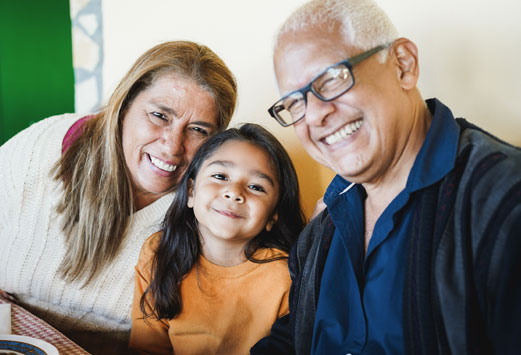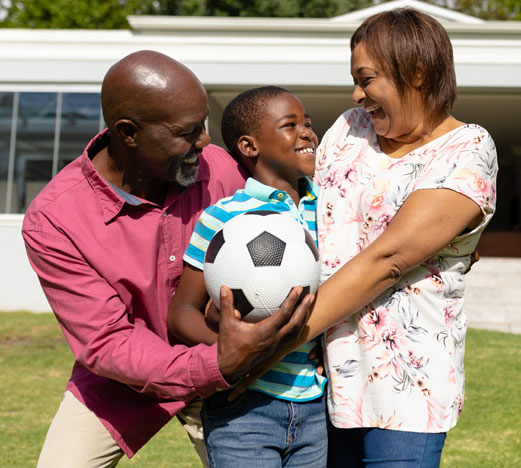Kinship
When families are unable to take care of their children/youth for any reason, often, extended family or members of the community come forward to assist. That's what kinship is all about!
When a child/youth is unable to remain at home because of child protection concerns, the Catholic Children’s Aid Society of Toronto looks to extended family members, such as grandparents, aunts, uncles, or a person who has had a significant relationship with the child/youth, to provide temporary care. As a kinship caregiver you will receive guidance and support from our Service Team to ensure that you and the child/youth’s needs are met.


Kinship Care model
In a Kinship Care model, children/youth come into the care of CCAS and a Kinship Care caregiver goes through the same assessment process and training as foster parents.
Kinship Service model
In a Kinship Service model, the child/youth is placed with a member of their extended family or with a community member known to them. A Kinship Assessment that is based on the Kinship Service Standards is required.
If you know a child/youth in your extended family who could benefit from kinship care or kinship service, and you think you have the special qualities and time to become their caregiver, please call 416-395-1500. Our staff will be pleased to assist and answer your questions and explain the process to you.
Kinship FAQs
- When children/youth are no longer able to remain in their home because of protection concerns, we often seek out extended family members or kin such as grandparents, aunts, uncles, or someone who has a meaningful relationship with the child/youth, to provide temporary care.
- Our staff will work with you to facilitate the process, support your family during the transition, and help you nurture connections between the child and birth parents.
- If you know a child/youth in your extended family who could benefit from kinship care or kinship service, and you think you have the special qualities and time to become their caregiver, please call 416-395-1500.
- Our Kinship staff will be pleased to assist and answer your questions and explain the process to you
You have the qualification to become a kinship caregiver if you have:
- an extended family or community connection to the child/youth
- the ability to care for a child/youth and make them feel wanted and loved
- a commitment to the child/youth’s emotional and individual development needs
- team collaboration and communication skills
- flexibility at work to be available for emergencies, school breaks, meetings, or a secondary caregiver that can provide this support
- committed to attend training/counselling sessions to support the child/youth
- They provide children/youth with a safe and nurturing home in a family-based environment when they are not able to remain in their own home because of child protection concerns.
- Kinship caregivers are role models, teachers, and nurturers to children/youth, who help them develop healthy self-esteem, values, and positive behaviours.
- Besides ensuring that a child/youth’s mental, emotional and physical needs are met, kinship caregivers help maintain familial, cultural, social and religious ties for a child/youth.
- Our kinship caregivers work as a team with CCAS staff, children/youth and their parents to establish the best plan of care and permanency for the child/youth.
- Children/youth experience less trauma when they are placed with their extended family and community members because they already have existing attachments and relationships with them.
- Kinship arrangements may make it easier for the child/youth to have more frequent contact with birth parents, and it may also provide a quicker resolution to the challenges faced by children/youth and their parents.
- As a kinship caregiver you will receive guidance and support from our Service Team to ensure that you and the child/youth’s needs are met.
- These supports could include baby-sitting, or recreational and social activities in the community.
- Kinship caregivers may also receive financial compensation depending on the Kinship model for the following expenses related to children/youth in their care:
- practical help with setting up your home to care for the child/youth
- day-to-day costs of raising a child/youth such as food, clothing, shelter, personal care items, general household costs
- medical/dental expenses
- Our Kinship community reflects Toronto’s diversity in language, race, culture, family constellation, gender, sexual orientation and economic circumstance.
- Some kinship caregivers work full-time outside of the home, while others are stay-at-home caregivers.
- All kinship caregivers share a genuine interest in the well-being of our community’s children/youth.
- Discussing your interest in becoming a kinship caregiver for a specific child/youth known to you and your family with our Staff
- Completing a home study process (Please discuss this with our Staff)

“In our experience we have always been involved in our grandson's life and would have been devastated if he was placed in foster home instead of our home two years ago. He has his own bedroom and settled in well with us as he always saw our home as his own. We feel that the benefits of children being placed with their families allows for a healthier growth and overall wellbeing. They grow up with a feeling of belonging and being connected to an extended family.”
~ Grandparents caring for their seven-year-old grandson